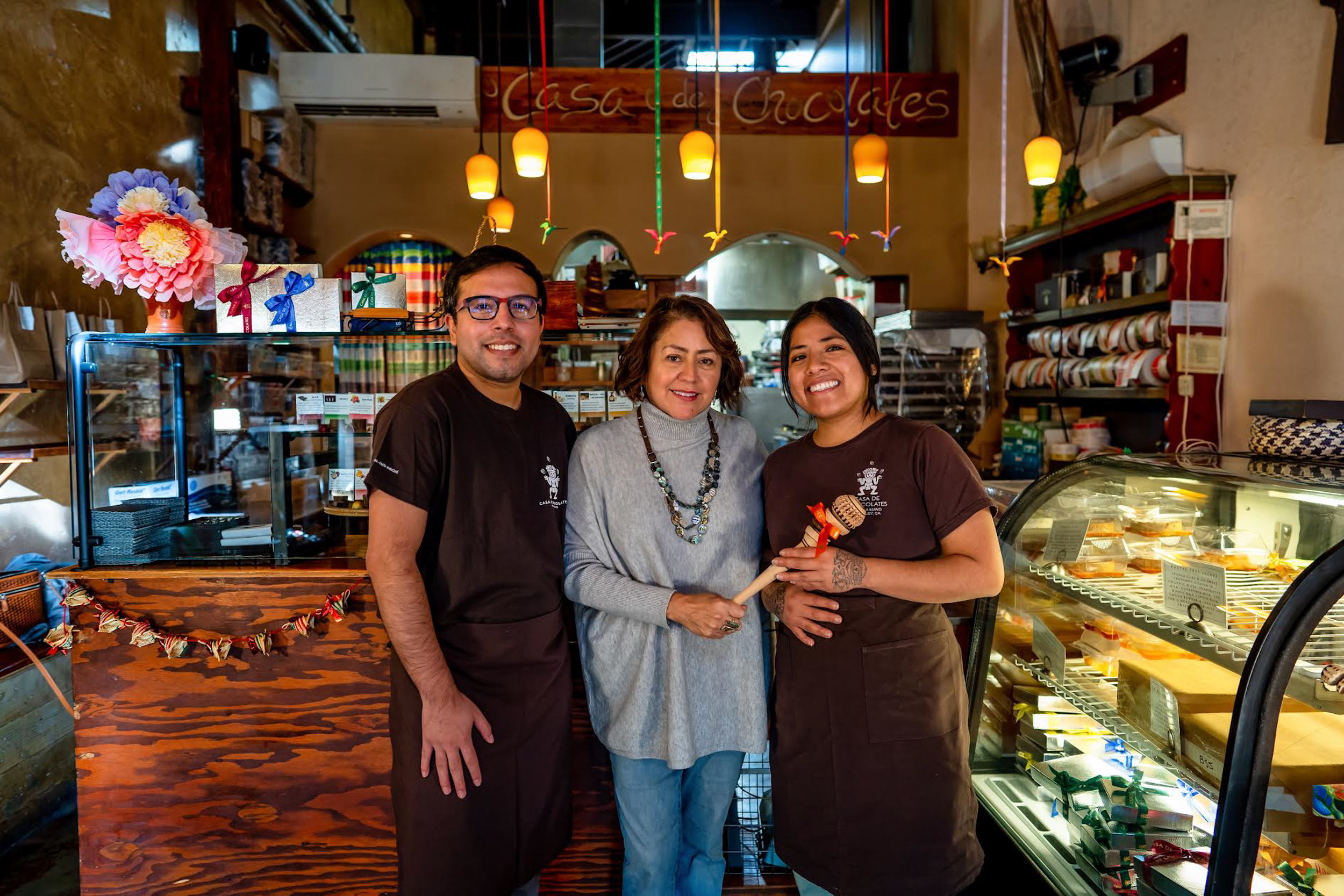Like a 21st century retelling of Charlie and the Chocolate Factory, UC Berkeley college students Linda Sanchez and Jesus Chavez first volunteered at a local chocolatier together over 10 years ago. In November, the original founders handed them the keys to the small-batch chocolate factory, assured that their younger successors understand their vision for a community-minded chocolatier that honors the origins of cacao.
The Willy Wonka-eseque turn of events couldn’t be more fitting for Casa de Chocolates, whose walls are literally dusted in cacao.
The Berkeley chocolatier would have Roald Dahl himself drooling—everything, from the white chocolate statue of la Virgen de Guadalupe behind the register to Casa de Chocolates’ wildly popular frozen hot chocolate, is made in-house.
Original owners Amelia Garcia and Arcelia Gallardo opened Casa de Chocolates in 2009 to remind their customers where chocolate comes from, in a world where Swiss, Belgian and other European producers reign supreme.
“We wanted to celebrate the culture of Latin America and all its flavors through chocolate,” said Garcia, who calls cacao “a fabulous gift to the world from Latin America.”
When the shop first opened, Gallardo was running a housing program for first-generation college students at Berkeley while also managing Casa de Chocolates with Garcia. Two of her student residents happened to be Sanchez and Chavez.
Soon after Garcia took the college freshmen under her wing, they started helping out at Casa de Chocolates in between classes.
An Indigenous Zapoteca from Oaxaca, Mexico, Sanchez has early memories of sipping tejate, a pre-hispanic maize and cacao drink, and roasting cacao beans with her grandmother.
Cacao is a core memory for Chavez, too, who was born in Michocán, Mexico.
“Since I was little, my grandma would ground cacao and make chocolate for drinking, but it wasn’t anything like these,” said Chavez, gesturing to the case of jewel-toned bonbons by the register of the shop.
As meaningful as cacao was to both of their childhoods, Chavez and Sanchez never really considered that it could become their future.
“We kind of fell into this,” said Sanchez, who now knows how to make everything in the shop’s display cases—from the Mayan Espresso bonbon to the goat milk caramel flan.
After more than a decade of stewarding the chocolatier, Garcia decided it was time for a new chapter that would mean more time with her grandchildren.
The successors were obvious: her first two volunteers and best friends that believed in Casa de Chocolates’ mission since day one.
“I am proud to partner with Linda and continue [Casa de Chocolate’s] legacy,” Chavez said in a press release. “Casa de Chocolates will remain a woman, Latinx, immigrant, indigenous and family-owned business, and I am proud to also add queer-owned.”
For both Chavez and Sanchez, taking up the mantle is just as much about the quality of their confections as it is about community and social justice.
In addition to their new venture as co-owners of the petite chocolate factory, Chavez is a director at Centro Legal de la Raza, which provides legal services for low-income people of color, and Sanchez is a director at Youth Organize California, which facilitates young people pursuing social change.
“If folks are interested in learning about chocolate and how to make it, our vision is to train them,” Chavez said.
The duo plans to strengthen Casa de Chocolates’ ties to the community, expand its relationship with small organic growers and remind consumers that Indigenous peoples pioneered the cultivation of cacao thousands of years before European colonizers ever landed in Latin America.
“The vision is really to highlight our connection to chocolate as Indigenous people,” Sanchez explained. “Because of colonization, we think of Swiss or Belgian chocolate as top quality, but we can’t forget that they actually come from Latin America.”
